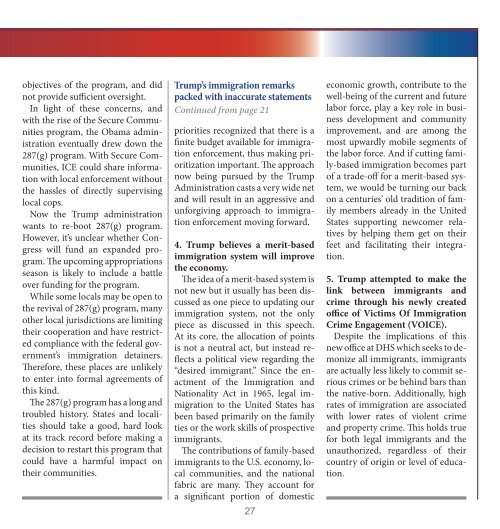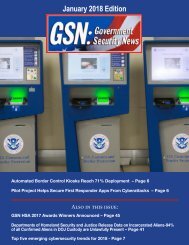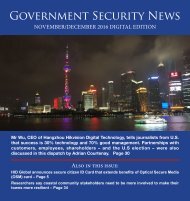GSN_Mar_YUMPU
Create successful ePaper yourself
Turn your PDF publications into a flip-book with our unique Google optimized e-Paper software.
objectives of the program, and did<br />
not provide sufficient oversight.<br />
In light of these concerns, and<br />
with the rise of the Secure Communities<br />
program, the Obama administration<br />
eventually drew down the<br />
287(g) program. With Secure Communities,<br />
ICE could share information<br />
with local enforcement without<br />
the hassles of directly supervising<br />
local cops.<br />
Now the Trump administration<br />
wants to re-boot 287(g) program.<br />
However, it’s unclear whether Congress<br />
will fund an expanded program.<br />
The upcoming appropriations<br />
season is likely to include a battle<br />
over funding for the program.<br />
While some locals may be open to<br />
the revival of 287(g) program, many<br />
other local jurisdictions are limiting<br />
their cooperation and have restricted<br />
compliance with the federal government’s<br />
immigration detainers.<br />
Therefore, these places are unlikely<br />
to enter into formal agreements of<br />
this kind.<br />
The 287(g) program has a long and<br />
troubled history. States and localities<br />
should take a good, hard look<br />
at its track record before making a<br />
decision to restart this program that<br />
could have a harmful impact on<br />
their communities.<br />
Trump’s immigration remarks<br />
packed with inaccurate statements<br />
Continued from page 21<br />
priorities recognized that there is a<br />
finite budget available for immigration<br />
enforcement, thus making prioritization<br />
important. The approach<br />
now being pursued by the Trump<br />
Administration casts a very wide net<br />
and will result in an aggressive and<br />
unforgiving approach to immigration<br />
enforcement moving forward.<br />
4. Trump believes a merit-based<br />
immigration system will improve<br />
the economy.<br />
The idea of a merit-based system is<br />
not new but it usually has been discussed<br />
as one piece to updating our<br />
immigration system, not the only<br />
piece as discussed in this speech.<br />
At its core, the allocation of points<br />
is not a neutral act, but instead reflects<br />
a political view regarding the<br />
“desired immigrant.” Since the enactment<br />
of the Immigration and<br />
Nationality Act in 1965, legal immigration<br />
to the United States has<br />
been based primarily on the family<br />
ties or the work skills of prospective<br />
immigrants.<br />
The contributions of family-based<br />
immigrants to the U.S. economy, local<br />
communities, and the national<br />
fabric are many. They account for<br />
a significant portion of domestic<br />
27<br />
economic growth, contribute to the<br />
well-being of the current and future<br />
labor force, play a key role in business<br />
development and community<br />
improvement, and are among the<br />
most upwardly mobile segments of<br />
the labor force. And if cutting family-based<br />
immigration becomes part<br />
of a trade-off for a merit-based system,<br />
we would be turning our back<br />
on a centuries’ old tradition of family<br />
members already in the United<br />
States supporting newcomer relatives<br />
by helping them get on their<br />
feet and facilitating their integration.<br />
5. Trump attempted to make the<br />
link between immigrants and<br />
crime through his newly created<br />
office of Victims Of Immigration<br />
Crime Engagement (VOICE).<br />
Despite the implications of this<br />
new office at DHS which seeks to demonize<br />
all immigrants, immigrants<br />
are actually less likely to commit serious<br />
crimes or be behind bars than<br />
the native-born. Additionally, high<br />
rates of immigration are associated<br />
with lower rates of violent crime<br />
and property crime. This holds true<br />
for both legal immigrants and the<br />
unauthorized, regardless of their<br />
country of origin or level of education.















